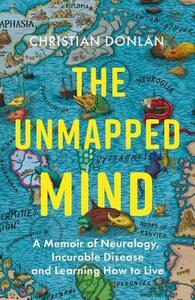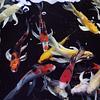Take a photo of a barcode or cover
11 reviews for:
The Unmapped Mind: A Memoir of Neurology, Multiple Sclerosis and Learning How to Live
Christian Donlan
11 reviews for:
The Unmapped Mind: A Memoir of Neurology, Multiple Sclerosis and Learning How to Live
Christian Donlan
The author has MS and he uses his illness to explain a little bit of neurology and a lot about the way he feels about life and his family and how he handles being sick. It was a very enlightening book for me, even if I studied MS I think I say it with different eyes and it was precious.
L'autore racconta la sua vita prima e dopo aver ricevuto la diagnosi di sclerosi multipla e utilizza la sua malattia per spiegare un po' di neurologia ma anche come ha deciso di gestirsi la malattia. È stato un libro importante per me, anche se avevo studiato la malattia non avevo mai capito a fondo quali sono le conseguenze dei suoi sintomi; è stato illuminante e molto prezioso.
THANKS NETGALLEY FOR THE PREVIEW!
L'autore racconta la sua vita prima e dopo aver ricevuto la diagnosi di sclerosi multipla e utilizza la sua malattia per spiegare un po' di neurologia ma anche come ha deciso di gestirsi la malattia. È stato un libro importante per me, anche se avevo studiato la malattia non avevo mai capito a fondo quali sono le conseguenze dei suoi sintomi; è stato illuminante e molto prezioso.
THANKS NETGALLEY FOR THE PREVIEW!
This is a brilliant book. Beautifully written account of the experience of living with MS but also lovely perspectives on the wonder of parenthood.
Having had the uncertainty and waiting before diagnosis then the questions and worries after diagnosis myself I found this book fascinating
emotional
hopeful
informative
inspiring
reflective
slow-paced
This is the memoir of a man newly diagnosed with MS. Married to a nurse and with a small daughter there are some times when he seems to have this thing sorted. However, the whole is really drear and maudlin to the extreme. He seems in a very short period of time to go from normal interventions to something way out of the ordinary and the whole is like a giant weight on his shoulders. I have no idea how i would react in the same situation and yes, maudlin is to some extent to be expected but I don't think i would have written and published about it. It was heavy going and really didn't define either the disease or its treatment and difficulties in a way that i would remember
adventurous
challenging
dark
emotional
informative
medium-paced
This review was originally posted on StrupagI enjoy the odd memoir and the description of this particular title grasped my attention. Probably for a variety of reasons 1) my Mum and my Aunt have MS 2) I have my own illness which requires a constant battle of learning how to live and 3) I wanted to learn more about the neurology of MS.
Before I started I must admit I'd no idea who Christian Donlan was, so I'd no idea what to expect in terms of writing - wow this man can write! It turns out he's an award-winning journalist, I can see why. From the first paragraph, I was hooked. You might look at the title of this book and worry that it'll be a bit heavy-going. Fear not, Donlan's writing style is absorbing, he makes the 'technical' stuff easy to read. Most of all, it's like sitting down in a room with a friend, chatting. That's really the best way I can describe this book. Donlan's writing and his turn of phrase is a delight - subject matter aside.
Donlan shares with us his journey as a thirty-something husband and new father as he discovers that he has MS.
But it's more than just his story. We learn about neurology and MS itself. Donlan tells the story of his own illness but also educates the reader on the scope, variety, and stages of MS. As I said, my Mum has MS so I have an understanding of the disease, but Mum's symptoms are largely different from Donlan's. I knew this could happen, as everyone's MS is different, but reading about further symptoms and challenges outwith my own, narrow field of vision was illuminating.
Likewise illuminating, inspiring-even is Donlan's incredible honesty within these pages. As a reader, I felt Donlan was completely open and honest, even when it perhaps might not reflect so well on him. I applaud his bravery and openness.
From my own personal perspective, Donlan's processing of his diagnosis was, I guess, reassuring. I could relate so much to that realisation that your life isn't going to be quite like you had envisioned. In fact, I rarely highlight text when I'm reading but there was much of this book that spoke to me, that I felt was worth noting and remembering.
Donlan's exploration of his relationships with those around him was a further area of great interest to me. It made me consider differing perspectives, not only how hard diagnosis and illness can be on the patient but on those around them too.
I fear I've rambled on a bit here, jumping all over - apologies. There is just so much to this book - a glimpse into a family at a turning point in their lives, the honesty, the impressive writing, the informative and educational side. Donlan lets us into his world and I guarantee that everyone will find something to take away from this book.
Before I started I must admit I'd no idea who Christian Donlan was, so I'd no idea what to expect in terms of writing - wow this man can write! It turns out he's an award-winning journalist, I can see why. From the first paragraph, I was hooked. You might look at the title of this book and worry that it'll be a bit heavy-going. Fear not, Donlan's writing style is absorbing, he makes the 'technical' stuff easy to read. Most of all, it's like sitting down in a room with a friend, chatting. That's really the best way I can describe this book. Donlan's writing and his turn of phrase is a delight - subject matter aside.
Donlan shares with us his journey as a thirty-something husband and new father as he discovers that he has MS.
But it's more than just his story. We learn about neurology and MS itself. Donlan tells the story of his own illness but also educates the reader on the scope, variety, and stages of MS. As I said, my Mum has MS so I have an understanding of the disease, but Mum's symptoms are largely different from Donlan's. I knew this could happen, as everyone's MS is different, but reading about further symptoms and challenges outwith my own, narrow field of vision was illuminating.
Likewise illuminating, inspiring-even is Donlan's incredible honesty within these pages. As a reader, I felt Donlan was completely open and honest, even when it perhaps might not reflect so well on him. I applaud his bravery and openness.
From my own personal perspective, Donlan's processing of his diagnosis was, I guess, reassuring. I could relate so much to that realisation that your life isn't going to be quite like you had envisioned. In fact, I rarely highlight text when I'm reading but there was much of this book that spoke to me, that I felt was worth noting and remembering.
Donlan's exploration of his relationships with those around him was a further area of great interest to me. It made me consider differing perspectives, not only how hard diagnosis and illness can be on the patient but on those around them too.
I fear I've rambled on a bit here, jumping all over - apologies. There is just so much to this book - a glimpse into a family at a turning point in their lives, the honesty, the impressive writing, the informative and educational side. Donlan lets us into his world and I guarantee that everyone will find something to take away from this book.
reflective
sad
Rarely have I been so delighted by a memoir about Multiple Sclerosis. I recommend Christian Donovan’s The Unmapped Mind: A memoir of neurology, incurable disease and learning how to live (2018) to anyone diagnosed with MS, as well as their nearest and dearest.
When I was diagnosed with MS (almost) five years ago, I hunted down as many books about MS as I could. All made me feel less alone, but few were well written. Donlan is a writer by trade, and it shows: Donlan tells his story, and he tells it well. The Unmapped Mind is an exploration of fatherhood, family and friendship. While MS is present on every page, is not explicitly mentioned until page 6 – a refreshing change from other MS memoirs, which tend to focus on the disease and not the life to be lived.
Donlan has RRMS, the most common form of MS. He asks a pointed question: ‘What does it mean to find yourself without a map?’. It is a question many with MS have pondered, because that is what living with MS is like: living in unchartered territory, where even the best case scenario is life changing and the worst case scenario is too distressing to contemplate.
Donlan writes with honesty, but also with insight. The descriptions of his symptom are beautiful and relatable: losing the feeling in his hands, being overwhelmed by trigeminal neuralgia, dealing with MS euphoria (which I must admit, almost sounds appealing) and confronting issues with proprioception. Donlan’s description of l’Hermittes sign (a symptom I know all too well) was so good I clapped my hands and made my partner read it. Thank you, Donlan, now I know I am not the only one to try to ‘control it a little… play it like a musical instrument’.
Donlan also considers the lives of famous people with MS and who he would like to be like. I’m not sure if anyone else does that, but I admit, I do. For me, I always go back to Joan Didion, although Donlan goes with Terri Garr. It turns out we both find the fictional President Bartlett from The West Wing ‘too lofty’.
My favourite sections, however, were those about Jean-Martin Charcot, the doctor who first identified MS. Understanding the history of MS treatments (and lack thereof) seems to give Donlan encouragement, and as a reader, I felt the same. Honestly, it feels good to be diagnosed in a decade where MS treatments have advanced so much. Donlan uses flashbacks to the work of Charcot, as well as the esteemed Oliver Sacks, to remind the reader that MS ‘is not the end of experience, but the beginning of a new strain of experience’.
If MS means anything to you or someone you love, Donlan’s observations will be a revelation for you. Even his reflections on his neurologist made me consider my own treatment… My neurologist ‘is one of the most important people in my life, and yet I have met him on only a handful of occasions, and spent less than an afternoon, all told, in his company’.
Congratulations to Donlan for a brilliant memoir on Multiple Sclerosis. And hats off to Penguin Viking for publishing such a wonderful book on a topic few publishers engage with. More like this, please.
This review was originally published by MS Australia on 26 July 2018. See the original review by Astrid at https://www.msaustralia.org.au/news-blogs/latest-news/book-review-unmapped-mind-christian-donlan.
When I was diagnosed with MS (almost) five years ago, I hunted down as many books about MS as I could. All made me feel less alone, but few were well written. Donlan is a writer by trade, and it shows: Donlan tells his story, and he tells it well. The Unmapped Mind is an exploration of fatherhood, family and friendship. While MS is present on every page, is not explicitly mentioned until page 6 – a refreshing change from other MS memoirs, which tend to focus on the disease and not the life to be lived.
Donlan has RRMS, the most common form of MS. He asks a pointed question: ‘What does it mean to find yourself without a map?’. It is a question many with MS have pondered, because that is what living with MS is like: living in unchartered territory, where even the best case scenario is life changing and the worst case scenario is too distressing to contemplate.
Donlan writes with honesty, but also with insight. The descriptions of his symptom are beautiful and relatable: losing the feeling in his hands, being overwhelmed by trigeminal neuralgia, dealing with MS euphoria (which I must admit, almost sounds appealing) and confronting issues with proprioception. Donlan’s description of l’Hermittes sign (a symptom I know all too well) was so good I clapped my hands and made my partner read it. Thank you, Donlan, now I know I am not the only one to try to ‘control it a little… play it like a musical instrument’.
Donlan also considers the lives of famous people with MS and who he would like to be like. I’m not sure if anyone else does that, but I admit, I do. For me, I always go back to Joan Didion, although Donlan goes with Terri Garr. It turns out we both find the fictional President Bartlett from The West Wing ‘too lofty’.
My favourite sections, however, were those about Jean-Martin Charcot, the doctor who first identified MS. Understanding the history of MS treatments (and lack thereof) seems to give Donlan encouragement, and as a reader, I felt the same. Honestly, it feels good to be diagnosed in a decade where MS treatments have advanced so much. Donlan uses flashbacks to the work of Charcot, as well as the esteemed Oliver Sacks, to remind the reader that MS ‘is not the end of experience, but the beginning of a new strain of experience’.
If MS means anything to you or someone you love, Donlan’s observations will be a revelation for you. Even his reflections on his neurologist made me consider my own treatment… My neurologist ‘is one of the most important people in my life, and yet I have met him on only a handful of occasions, and spent less than an afternoon, all told, in his company’.
Congratulations to Donlan for a brilliant memoir on Multiple Sclerosis. And hats off to Penguin Viking for publishing such a wonderful book on a topic few publishers engage with. More like this, please.
This review was originally published by MS Australia on 26 July 2018. See the original review by Astrid at https://www.msaustralia.org.au/news-blogs/latest-news/book-review-unmapped-mind-christian-donlan.
"In a hospital ward like this, you get a chance to see what remains once the hollowing has done its work. And it's the Pavlovian stuff that remains. The rituals that have become hardened, that have become the stuff of neurons themselves. To fire together is to wire together: behavior eventually becomes matter. Edward's desire to take control, to make us safe. Phil's desire to keep everyone entertained. A lifetime of programming is building up. What will be left when the conscious engine starts to spin down? It makes me wonder: what is my programming? What will be left of me?"
A beautiful meditation on what it means to live life: as a parent, as a person with MS, as an "inward" dreamer. This was a thought provoking story, poetically told.
A beautiful meditation on what it means to live life: as a parent, as a person with MS, as an "inward" dreamer. This was a thought provoking story, poetically told.




